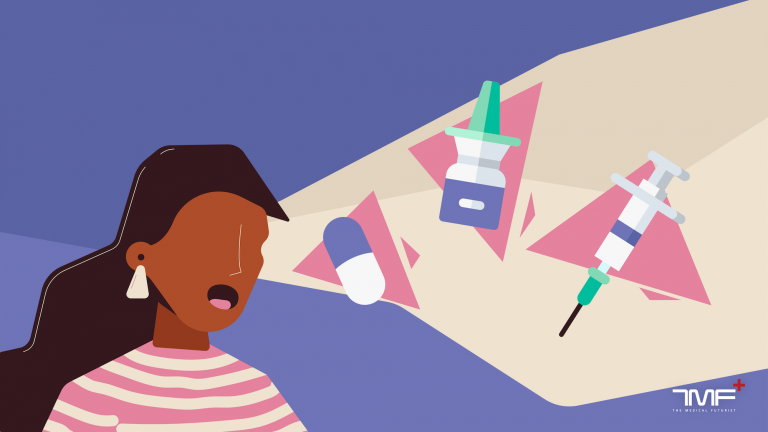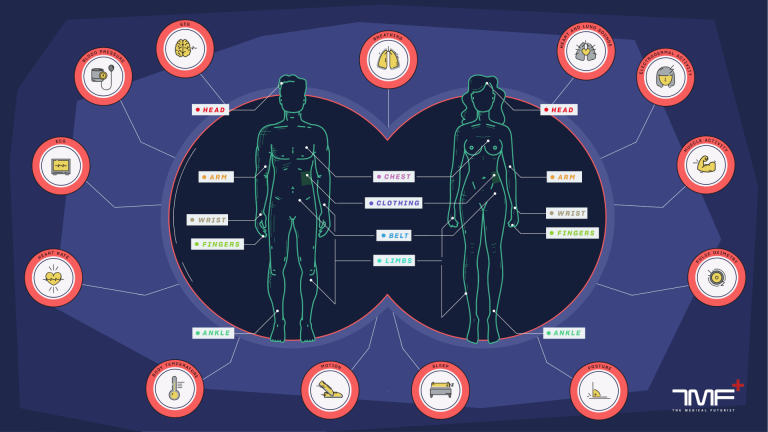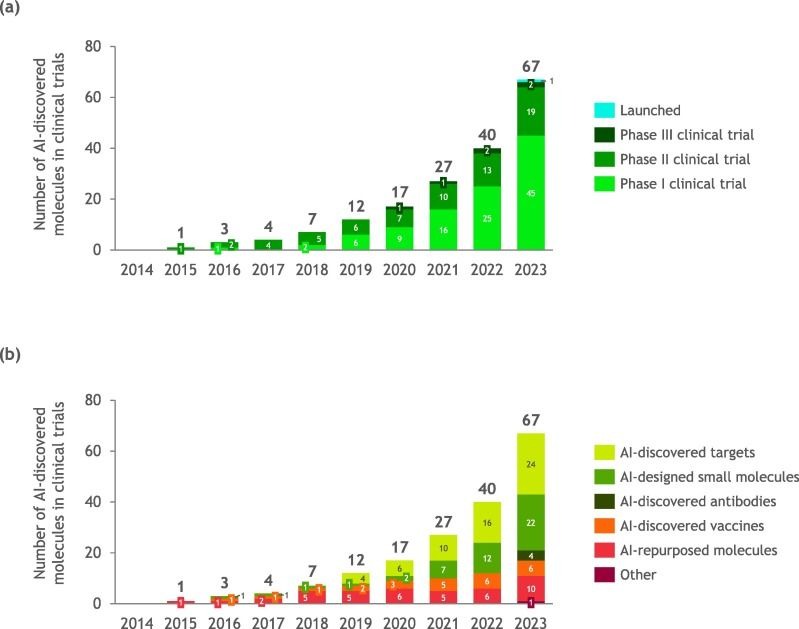Over the past decade, Dr. Bertalan Meskó, our lead researcher, has been a keynote speaker at numerous top pharmaceutical companies globally. Known as The Medical Futurist, he dedicates his time to envisioning the future of healthcare, a task that is both intricate and captivating. While his work spans various medical aspects, ranging from regulations and policies to clinical practice, research, and technological advancements, the pharmaceutical sector has been his primary focus for the last 15 years.
Current Trends in Digital Health and AI within Pharma
Through the years, Dr. Meskó has identified several trends that are poised to shape the pharmaceutical landscape in the future. Some of these trends are clearly visible on the horizon, while others offer a more speculative peek into what might lie ahead. In this piece, we will delve into both the evident and the less certain impacts of the digital health and AI revolution on the pharmaceutical industry, as of 2024.
AI Applications in Low-Risk, High-ROI Fields
One of the most promising applications of AI in the pharmaceutical realm lies in low-risk, high-return-on-investment (ROI) domains, such as drug design, drug repurposing, and clinical trials. AI algorithms can swiftly and accurately analyze extensive datasets to pinpoint potential drug candidates in drug design, outperforming traditional methods.
Utilizing Generative AI to Enhance Company Operations
Pharmaceutical companies are not solely leveraging AI to discover new therapies but also to optimize their internal processes. For instance, Roche has introduced RocheGPT, an internal generative AI chatbot aimed at streamlining repetitive tasks, facilitating intra-team knowledge sharing, and enhancing analysts' endeavors by parsing scientific articles and clinical test outcomes to extract structured data on therapies and patients.
From Patient Centricity to Patient Design
The traditional pharmaceutical landscape has historically adopted a paternalistic approach towards patients, making decisions about them rather than with them. However, this dynamic is gradually evolving towards a collaborative model, recognizing patients as active participants in their healthcare journey. This shift towards patient design underscores the importance of involving patients as co-creators in the development of healthcare solutions.
Automating the Pharmaceutical Supply Chain
The pharmaceutical supply chain is undergoing a significant transformation through the integration of robotics, AI, and blockchain technology. These innovations streamline operations, boost efficiency, and ensure enhanced transparency and security.

Investing in Digital Therapeutics
Pharmaceutical companies are increasingly acknowledging the potential of digital therapeutics (DTx) as complements to traditional medications. DTx are evidence-based software applications designed to prevent, manage, or treat medical conditions, offering a personalized, scalable, and accessible approach to healthcare.
Launch and Closure of Digital Health Units
Many pharmaceutical companies have established dedicated units focused on developing and commercializing digital solutions. While some ventures have been successful, others have faced challenges, leading to the closure of digital health units.
Future Innovations: In-Silico Trials and Artificial Patients
The future of drug development might witness in-silico trials, where digital representations of human biology are used to test new drugs, potentially revolutionizing clinical trials. Additionally, artificial patients could serve as tools for estimating efficiency and side effects of drug molecules or optimizing treatment methods.
Transitioning to a Post-Digital Transformation Era
As digital technologies become deeply integrated into pharmaceutical operations, the industry is moving towards a post-digital transformation era. AI, machine learning, and data analytics will play integral roles in various aspects of pharma, necessitating a cultural shift towards embracing technology as a catalyst for innovation.
3D Printing Drugs
The development of 3D printing drugs represents an exciting frontier in pharmaceuticals, with the potential to customize medications based on individual needs. This innovation could transform medication adherence and efficacy, particularly by enabling decentralized drug manufacturing.
The Medical Futurist team closely monitors technological advancements in the pharma sector, reporting on significant developments through various channels and providing detailed analyses on their website.

This article was originally published on The Medical Futurist.
Frequently Asked Questions
What are alternative medicine examples?
Alternative medicine is a treatment that does not fit the criteria of mainstream medicine. These include traditional Chinese medicine, homeopathy, chiropractic, acupuncture, herbal medicines, nutritional therapy, and energy healing techniques such as reiki.
Alternative medicine may also refer to practices not based on scientific evidence but used successfully in clinical practice. You can use meditation, hypnosis and yoga to achieve this.
What is the difference between traditional and holistic medicine?
Traditional medicine tends to treat symptoms while holistic medicine treats the entire person. Holistic medicine looks at the patient as a whole rather than just focusing on one aspect of his/her health.
Traditional medicine treats only a few organs or system (such as the mind), while holistic medicine addresses all aspects of the human body. It also examines the effects of lifestyle choices on overall wellbeing.
What makes holistic medicine superior?
Holistic health care treats the whole person instead of just specific symptoms. Holistic healthcare focuses on the whole person, not just individual symptoms. This includes how they feel, what they eat and where they live.
Holistic medicine takes into account all aspects of a patient’s life and treats them like a whole package. Although this sounds easy in theory, it's very difficult to do in practice. Many doctors only focus on the physical aspects of patients.
What is the difference between alternative medicine, complementary medicine and other medicine?
Alternative medicine is a treatment that is not commonly used by mainstream medical professionals, but has been proven to be beneficial for certain conditions. You can find examples of acupuncture as homeopathy, aromatherapy or reflexology, traditional Chinese medicine (TCM), Ayurveda, and even naturopathy. Complementary medicines refer to those therapies which complement conventional treatment; they may be used alongside conventional medicine. These include dietary supplements such as vitamins, minerals, herbs, amino acids, enzymes, probiotics, and other natural substances.
Although both types of medicine are common, conventional doctors don't recommend them because there isn't enough evidence or safety concern.
There isn't consensus among health-care providers on the best way to incorporate CAM into patient treatment.
Many CAM practices are based upon theories that have been around for thousands of years. However, clinical trials over the past 20 years suggest that some of these therapies might work.
A number of studies suggest that acupuncture may be able to relieve pain. It may also reduce nausea and vomiting that are associated with chemotherapy, according to preliminary data. Some studies have shown that acupuncture may be beneficial for irritable bowel syndrome (FBS), fibromyalgia and chronic fatigue syndrome, multiple Sclerosis, migraines, tension headaches as well as anxiety and depression.
Some CAM techniques may also be beneficial in treating diseases like HIV/AIDS (AIDS), diabetes, heart disease and hypertension.
While there are still questions about the effectiveness of CAM in treating different ailments, most experts agree it is possible.
People are increasingly turning to CAM practitioners to find relief from common ailments.
Despite the popularity of alternative and complementary medicine, many people are still unsure what they mean.
Is holistic medical safe?
Holistic Medicine is not as dangerous as you may think, but several risks are involved when using this treatment. Side effects include nausea, headaches, dizziness. drowsiness. diarrhea. constipation. These side effects should be understood and balanced against the benefits associated with alternative treatments like acupuncture.
There have never been any cases of death related to holistic medicine.
Always consult your doctor before beginning any new treatment plan.
Statistics
- In 83% of the cases, the readers agreed. (en.wikipedia.org)
- According to a 2005 book by a US [116]Institute of Medicine panel, the number of RCTs focused on CAM has risen dramatically. (en.wikipedia.org)
- category.[111]Edzard Ernst characterized the evidence for many alternative techniques as weak, nonexistent, or negative and in 2011, published his estimate that about 7.4% were based on “sound evidence.” However, he believes that may be an overestimate. (en.wikipedia.org)
- The use of alternative medicine in the US has increased, with a 50 percent increase in expenditures and a 25 percent increase in the use of alternative therapies between 1990 and 1997 in America. (en.wikipedia.org)
- According to the World Health Organization, 80% of people use herbal medicine worldwide. (webmd.com)
External Links
liebertpub.com
- Games for Health Journal, Mary Ann Liebert, Inc., publishers
- Acupuncture for Treatment of Insomnia: A Systematic Review of Randomized Controlled Trials
webmd.com
ncbi.nlm.nih.gov
- BIOFEEDBACK TRAINING FOR TENSION-TYPE HEADACHE–PubMed
- PubMed: Randomized controlled trial examining the effects of foot reflexology on hospital anxiety and depression in female older adults.
cam.cancer.gov
How To
How to Deal with My Girlfriend Who Trusts Alternative Medicine
You can find advice on the internet for people who are caring for someone with mental illness. The internet isn't able to provide much help for those who believe in alternative medicines.
It appears that there is a large divide between the two groups. There are two types of people: those who doubt conventional medicine and those who are open to its benefits.
What happens when you come across someone who believes in alternative treatments for mental health issues?
Because you don’t know where to start, you may feel confused and frustrated. So what do you say to your partner when he tells you he wants to go to an acupuncturist instead of his doctor? Or when he says he'd rather have antidepressants than eat gluten-free.
It is important to ask questions. It could save you lots of heartache later.
However, how can you ask such difficult questions without offending him What if he says that he doesn't trust doctors? Do you tell him he shouldn’t trust anyone?
Or what if she says that she thinks that antidepressants aren't working? Do you need to tell her that she's wrong
This is where the conversation becomes tricky. She may be even more offended if it is pointed out that she is wrong.
Alternatively, you could suggest that she sees a psychiatrist instead. This could cause more problems than it solves. This could cause her to be upset at you. You might be trying to control your life, but she might get angry at you.
So what are you supposed to do?
–
——————————————————————————————————————————————
This blog is a source of general information and discussion on health and related topics. Information and materials on this blog, on the website, or in any of the connected materials are not intended to replace or used as a substitute for the advice of a medical professional, diagnosis, or treatment. This blog does not represent the application of any nursing, medical or other health professional advice or diagnosis. We are unable to diagnose health conditions, offer second opinions or provide specific treatment recommendations via this blog or on our website.
If you or another person is suffering from a medical issue and you are concerned, consult your doctor or seek out other medical professional treatment as soon as possible. Do not disregard medical advice from a professional or delay seeking it due to information you seen on the blog or website or in any of the linked materials. If you're experiencing an emergency medical situation, dial 911 or seek emergency medical assistance on the closest phone immediately.
——————————————————————————————————————————————
By: Andrea Koncz
Title: The Future of AI and Digital Health in Pharma: A Game-Changing Prescription
Sourced From: medicalfuturist.com/the-ai-and-digital-health-future-of-pharma-prescription-for-change
Published Date: Thu, 20 Jun 2024 07:30:00 +0000
Frequently Asked Questions
What are alternative medicine examples?
Alternative medicine is a treatment that does not fit the criteria of mainstream medicine. These include traditional Chinese medicine, homeopathy, chiropractic, acupuncture, herbal medicines, nutritional therapy, and energy healing techniques such as reiki.
Alternative medicine may also refer to practices not based on scientific evidence but used successfully in clinical practice. You can use meditation, hypnosis and yoga to achieve this.
What is the difference between traditional and holistic medicine?
Traditional medicine tends to treat symptoms while holistic medicine treats the entire person. Holistic medicine looks at the patient as a whole rather than just focusing on one aspect of his/her health.
Traditional medicine treats only a few organs or system (such as the mind), while holistic medicine addresses all aspects of the human body. It also examines the effects of lifestyle choices on overall wellbeing.
What makes holistic medicine superior?
Holistic health care treats the whole person instead of just specific symptoms. Holistic healthcare focuses on the whole person, not just individual symptoms. This includes how they feel, what they eat and where they live.
Holistic medicine takes into account all aspects of a patient’s life and treats them like a whole package. Although this sounds easy in theory, it's very difficult to do in practice. Many doctors only focus on the physical aspects of patients.
What is the difference between alternative medicine, complementary medicine and other medicine?
Alternative medicine is a treatment that is not commonly used by mainstream medical professionals, but has been proven to be beneficial for certain conditions. You can find examples of acupuncture as homeopathy, aromatherapy or reflexology, traditional Chinese medicine (TCM), Ayurveda, and even naturopathy. Complementary medicines refer to those therapies which complement conventional treatment; they may be used alongside conventional medicine. These include dietary supplements such as vitamins, minerals, herbs, amino acids, enzymes, probiotics, and other natural substances.
Although both types of medicine are common, conventional doctors don't recommend them because there isn't enough evidence or safety concern.
There isn't consensus among health-care providers on the best way to incorporate CAM into patient treatment.
Many CAM practices are based upon theories that have been around for thousands of years. However, clinical trials over the past 20 years suggest that some of these therapies might work.
A number of studies suggest that acupuncture may be able to relieve pain. It may also reduce nausea and vomiting that are associated with chemotherapy, according to preliminary data. Some studies have shown that acupuncture may be beneficial for irritable bowel syndrome (FBS), fibromyalgia and chronic fatigue syndrome, multiple Sclerosis, migraines, tension headaches as well as anxiety and depression.
Some CAM techniques may also be beneficial in treating diseases like HIV/AIDS (AIDS), diabetes, heart disease and hypertension.
While there are still questions about the effectiveness of CAM in treating different ailments, most experts agree it is possible.
People are increasingly turning to CAM practitioners to find relief from common ailments.
Despite the popularity of alternative and complementary medicine, many people are still unsure what they mean.
Is holistic medical safe?
Holistic Medicine is not as dangerous as you may think, but several risks are involved when using this treatment. Side effects include nausea, headaches, dizziness. drowsiness. diarrhea. constipation. These side effects should be understood and balanced against the benefits associated with alternative treatments like acupuncture.
There have never been any cases of death related to holistic medicine.
Always consult your doctor before beginning any new treatment plan.
Statistics
- In 83% of the cases, the readers agreed. (en.wikipedia.org)
- According to a 2005 book by a US [116]Institute of Medicine panel, the number of RCTs focused on CAM has risen dramatically. (en.wikipedia.org)
- category.[111]Edzard Ernst characterized the evidence for many alternative techniques as weak, nonexistent, or negative and in 2011, published his estimate that about 7.4% were based on “sound evidence.” However, he believes that may be an overestimate. (en.wikipedia.org)
- The use of alternative medicine in the US has increased, with a 50 percent increase in expenditures and a 25 percent increase in the use of alternative therapies between 1990 and 1997 in America. (en.wikipedia.org)
- According to the World Health Organization, 80% of people use herbal medicine worldwide. (webmd.com)
External Links
liebertpub.com
- Games for Health Journal, Mary Ann Liebert, Inc., publishers
- Acupuncture for Treatment of Insomnia: A Systematic Review of Randomized Controlled Trials
webmd.com
ncbi.nlm.nih.gov
- BIOFEEDBACK TRAINING FOR TENSION-TYPE HEADACHE–PubMed
- PubMed: Randomized controlled trial examining the effects of foot reflexology on hospital anxiety and depression in female older adults.
cam.cancer.gov
How To
How to Deal with My Girlfriend Who Trusts Alternative Medicine
You can find advice on the internet for people who are caring for someone with mental illness. The internet isn't able to provide much help for those who believe in alternative medicines.
It appears that there is a large divide between the two groups. There are two types of people: those who doubt conventional medicine and those who are open to its benefits.
What happens when you come across someone who believes in alternative treatments for mental health issues?
Because you don’t know where to start, you may feel confused and frustrated. So what do you say to your partner when he tells you he wants to go to an acupuncturist instead of his doctor? Or when he says he'd rather have antidepressants than eat gluten-free.
It is important to ask questions. It could save you lots of heartache later.
However, how can you ask such difficult questions without offending him What if he says that he doesn't trust doctors? Do you tell him he shouldn’t trust anyone?
Or what if she says that she thinks that antidepressants aren't working? Do you need to tell her that she's wrong
This is where the conversation becomes tricky. She may be even more offended if it is pointed out that she is wrong.
Alternatively, you could suggest that she sees a psychiatrist instead. This could cause more problems than it solves. This could cause her to be upset at you. You might be trying to control your life, but she might get angry at you.
So what are you supposed to do?

